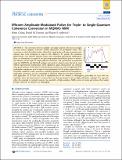Efficient amplitude-modulated pulses for triple- to single-quantum coherence conversion in MQMAS NMR
View/
Date
21/07/2014Grant ID
EP/E041825/1
614290 - EXONMR
EP/J501542/1
EP/J501542/1
Keywords
Metadata
Show full item recordAbstract
The conversion between multiple- and single-quantum coherences is integral to many nuclear magnetic resonance (NMR) experiments of quadrupolar nuclei. This conversion is relatively inefficient when effected by a single pulse, and many composite pulse schemes have been developed to improve this efficiency. To provide the maximum improvement, such schemes typically require time-consuming experimental optimization. Here, we demonstrate an approach for generating amplitude-modulated pulses to enhance the efficiency of the triple- to single-quantum conversion. The optimization is performed using the SIMPSON and MATLAB packages and results in efficient pulses that can be used without experimental reoptimisation. Most significant signal enhancements are obtained when good estimates of the inherent radio-frequency nutation rate and the magnitude of the quadrupolar coupling are used as input to the optimization, but the pulses appear robust to reasonable variations in either parameter, producing significant enhancements compared to a single-pulse conversion, and also comparable or improved efficiency over other commonly used approaches. In all cases, the ease of implementation of our method is advantageous, particularly for cases with low sensitivity, where the improvement is most needed (e.g., low gyromagnetic ratio or high quadrupolar coupling). Our approach offers the potential to routinely improve the sensitivity of high-resolution NMR spectra of nuclei and systems that would, perhaps, otherwise be deemed "too challenging".
Citation
Colaux , H , Dawson , D M & Ashbrook , S E 2014 , ' Efficient amplitude-modulated pulses for triple- to single-quantum coherence conversion in MQMAS NMR ' , Journal of Physical Chemistry A , vol. 118 , no. 31 , pp. 6018-25 . https://doi.org/10.1021/jp505752c
Publication
Journal of Physical Chemistry A
Status
Peer reviewed
ISSN
1089-5639Type
Journal article
Description
We thank EPSRC (EP/E041825/1 and EP/J501542/1) for support, for the award of a studentship to H.C. We also thank the ERC (EU FP7 Consolidator Grant 614290 “EXONMR”).Collections
Items in the St Andrews Research Repository are protected by copyright, with all rights reserved, unless otherwise indicated.

